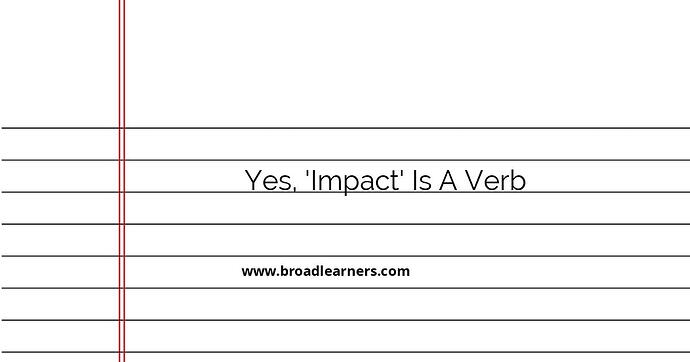The term 'impact' is often debated in terms of its usage as a verb in the English language. Traditionally, 'impact' has been recognized as a noun, referring to the act of one object coming forcibly into contact with another. However, in contemporary English, 'impact' is also widely accepted as a verb, indicating the action of affecting or influencing something strongly. In this article, we will explore how 'impact' functions as a verb, provide examples, and discuss its grammatical appropriateness in both spoken and written contexts.
Understanding 'Impact' as a Verb
As a verb, 'impact' means to have a strong effect on someone or something. It is used to describe the process of influencing or making a significant difference to a situation, object, or person. Although some traditional grammarians may still prefer alternatives, such as 'affect' or 'influence,' the verb 'impact' is increasingly accepted in both formal and informal usage.
Examples of 'Impact' Used as a Verb:
- The New Policy Impacted Sales Positively
Usage: This sentence illustrates how a policy applied by a company can influence the growth or decline of its sales figures. It conveys the idea that the policy played a significant role in enhancing sales.
After implementing the new discount strategy, the policy impacted sales positively, leading to a record-high quarter.
- His Speech Impacted the Audience Profoundly
Usage: This expression demonstrates how someone's speech deeply influenced the listeners, possibly affecting their emotions or opinions.
His heartfelt speech on climate change impacted the audience profoundly, inspiring many to adopt more sustainable practices.
- The Economic Crisis Impacted Global Markets
Usage: This example shows how an economic downturn can heavily influence or disturb financial markets worldwide.
The ongoing economic crisis impacted global markets, leading to a downturn in stock values.
- The Weather Impacted Our Travel Plans
Usage: Here, the sentence indicates that adverse weather conditions affected the original plan to travel.
The unexpected snowstorm impacted our travel plans, forcing us to reschedule the trip.
Using 'impact' as a verb is increasingly common, especially in business and media contexts, due to its powerful and direct connotation.
Conclusion: The Appropriateness of 'Impact' as a Verb
The use of 'impact' as a verb is an example of how language evolves to reflect the dynamic nature of communication in various fields. While some may still prefer alternatives like 'affect,' it is important to recognize that the use of 'impact' as a verb is widely established and understood today. Whether writing an academic paper, creating a business report, or engaging in casual conversations, being aware of both traditional and modern uses of language showcases versatility and competency in communication.
Did I miss anything? Respond below
